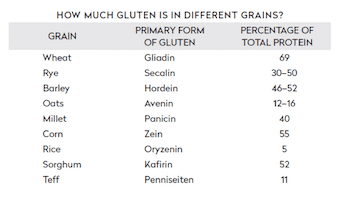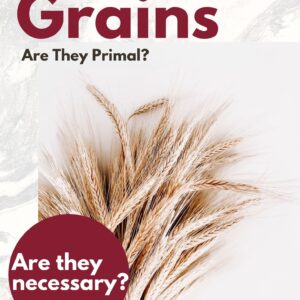I earn a small commission via affilate links at no extra cost to you.
One of the hallmarks of the paleo lifestyle is going grain-free. Many of us have found that going gluten-free to try to manage leaky gut syndrome simply isn’t enough. Grains adversely affect gut health in a number of ways, along with other health consequences. The reasons to go grain-free in the paleo lifestyle is centered around the life of a hunter-gatherer. Imagine how different your life would be if you were living out in nature. If you only looked at sugar intake, how much sugar could you find in the forest in the winter? How does that amount of sugar compare with today’s modern world and packaged food? The general principle is when it comes to food we have one simple rule:
Food either makes your more healthy or less healthy; if it’s less healthy then don’t eat it.
Living in America our food system is heavily grain-based. We eat everything in, on, wrapped, or with a side of grains. They are so ingrained into our psyche that when I suggest reasons for a person to go grain-free for a bit they immediately get a look of panic on their face and ask me what I eat. People don’t think food exists outside of grains, or they think gluten free is enough, and that is one of the primary reasons we currently have a health care crisis. We have an epidemic of chronic health conditions, leaky gut syndrome, weight loss struggles, and gut health challenges created by grains.
 Weight Loss Is A Great Reason To Go Grain Free
Weight Loss Is A Great Reason To Go Grain Free
Living in a society that is obsessed with weight and weight loss tips there is an easy solution to the problem. Go grain free. Heck, when I gave up wheat, and only wheat, I dropped a pant size. (I went from an 8 to a 6 without trying.) I didn’t do any extra exercise, count calories, or watch portions. I simply quit eating grains.
Since going paleo and giving up all grains, dairy, legumes, vegetable oils, and processed foods I’m a size 4 at age 43. I have never been a size 4 in my life until I went paleo. If you ever go to a paleo conference like Paleo f(x) you’ll see something you don’t see in everyday life; everyone is fit with a healthy glow. It’s a segment of society all in one place that is a visual testament to ancestral health.
How do grains contribute to weight gain? When it comes to macro-nutrients grains fall into the carbohydrate category. What does that mean? It means that when your body metabolizes grains the end product is glucose. Sure glucose is fat-free and low-calorie but ever since that dietary advice became mainstream conventional wisdom we’ve watched the overall health of Americans plummet.
The Reader’s Digest Version: Your body can store glucose in the muscle tissue and the liver. When those two tissues are full of glucose (stored as glycogen) the body begins converting the excess glucose to triglycerides which are then stored as fat. In order for your body to burn stored body fat insulin needs to become scarce because insulin promotes storage.
When insulin is low then the body can access stored body fat for fuel, however, you can’t do this all in a day. First, you need to become fat-adapted by consistently eating high fat, moderate protein, and low carbohydrates for a few weeks. You have to rebuild the metabolic machinery, to remind your body how to access stored body fat.
Most people who have been eating SAD (Standard American Diet) have been bombarding themselves with glucose day after day. Before drastically changing your diet and going grain-free check with a medical professional and/or a health coach. Everyone has different health issues. Some adjustments may need to be made to tailor the grain-free approach to fit your health needs. I explain this in greater detail in Is Your Diet Making You Fat? Going grain-free is one of those weight loss tips that has allowed so many to see weight loss transformation on the keto diet.
What does the role of a high carbohydrate diet do to a person over time? Let’s look at someone with Type 2 diabetes. They are at greater risk for heart, liver, and kidney disease; neuropathy; glaucoma; Alzheimer’s/Dementia; and cancer. That is the role that a lifetime of high carbohydrate eating does: it destroys everything. If you look at the rates of heart disease and how they correlate to the government’s dietary recommendations you’ll see that their advice has not reduced the number of cases of heart disease.
If you want to eat carbohydrates after a hard workout to replenish muscle glycogen vegetables offer a nutrient dense source. Vegetables can also be less offensive to gut health than grains, but not always. (It depends on the vegetable.)
Type 2 Diabetes and Insulin Resistance
Diabetes is defined as a person having high blood sugar, insulin resistance, and a relative lack of insulin. Normal blood sugar is 5 grams or 1 teaspoon of sugar dissolved in the blood. A person who has type 2 diabetes has 1.25 teaspoons of sugar dissolved in the blood. That isn’t 1 teaspoon dissolved in the vial of blood the phlebotomist draws, that’s 1 teaspoon dissolved in all of the blood of an adult human.
Go look at your measuring spoons if you need a reminder of how small a teaspoon is. Imagine you are a hunter-gatherer living in the forest. If I told you to go find something sweet to eat how difficult would it be? Unless you come across a berry patch in the summer or you know where to dig up root vegetables you aren’t going to find much. Even then, compare the amount of sugar you can find in nature to the amount of sugar you can buy in a supermarket.
In that supermarket, the majority of the products sold contain grains, with added sugar. From a metabolic standpoint, they both metabolize into glucose. This is one of the reasons why eliminating sugar and/or going gluten-free often isn’t enough. If you’re not grain-free there’s a good chance you’re still getting your glucose (sugar) from the grains you eat. Modern wheat is the largest offender because it raises blood sugar more than table sugar does. When the body is bombarded with glucose type 2 diabetes can develop. Over time the liver and muscle cells become resistant to the storage signals of insulin which is known as insulin resistance.
Grains Contribute to Inflammation [1]
Inflammation has been associated with nearly every disease. Arthritis is inflammation of the joints. Heart disease and atherosclerosis are triggered by inflammation of the arteries. Colitis is inflammation of the colon. Dermatitis is inflammation of the skin. Any disease you can think of that ends in “-itis” is an inflammatory disease because in Latin “itis” means inflammation. Grains are inflammatory because they contain 3 different compounds: Gluten, Lectins, and Phytates.
Inflammation has long been a well-known symptom of many infectious diseases, but molecular and epidemiological research increasingly suggests that it is also intimately linked with a broad range of non-infectious diseases, perhaps even all of them. [2]
Non-infectious diseases means chronic diseases: cancers, chronic digestive disorders, asthma, cardiovascular disease, neurological disorders, autoimmunity, and arthritis. The underlying cause of these non-infectious chronic diseases? Leaky gut syndrome.
Lectins In Grains Contribute To Leaky Gut Syndrome And Systemic Inflammation
Lectins are proteins that exist in all plants to some degree. The most famous lectin is gluten. Lectins are part of a plant’s defense system because they make seeds resistant to digestion. (This is why grains and legumes are both high in lectins; they’re seeds.) The lectins are there to deter animals and humans from eating them because a seed’s ultimate goal is to reach the soil to plant the next generation. They either make humans feel sick or as in the animal world they pass through undigested in their very own pile of compost. Nature is pretty smart!
Most of the grains we eat aren’t toxic enough to make us sick right away, rather they work silently in the background. Enterocytes are cells that line the small intestine and when they encounter a lectin they think it’s a simple sugar so they willingly transport the lectin from inside the intestine to outside of the intestine. Enterocytes have mechanisms to repair themselves to prevent large gaps from developing in the small intestine but lectins inhibit that repair process. This is one of the many reasons why going gluten-free simply isn’t enough if you want to prevent or heal leaky gut syndrome. All grains contain lectins, even those that are “gluten-free”. Lectins are the reason all grains, legumes, seeds, nuts, and seed spices are eliminated on gut healing protocols, they contain lectins.
As leaky gut syndrome develops lectins and other undigested food particles can leak outside the intestines. The lectins trigger an autoimmune response because they’re not supposed to be there. This can then cause the immune system to attack the enterocytes and create larger holes in the small intestine and lead to the formation of a leaky gut syndrome. There are many things in our intestines like E.Coli that are supposed to stay there and when they leak out of the intestine they create systemic inflammation. When they are outside of the digestive tract it is the immune system’s job to seek out foreign invaders. How does the immune system respond? It responds like it does when there is an injury or an infection; it responds with inflammation.
If you’re struggling with health issues the first place to look is your gut. Unfortunately grains are number one on the chopping block if you want to begin to improve your gut health. Since the reaction a person has to lectins isn’t always in the digestive tract people don’t often equate their health issue with what they’re eating. If I had a dollar for every time someone complained about not feeling well and I asked them what they were eating I’d have my own island. What is craziest to me is that when I try to link food to their ill health most people don’t think there is a connection. A tiny bit of bloating or gas after eating, allergies, arthritis, headaches, skin conditions, neurological conditions, autoimmune issues, heart disease, diabetes, metabolic syndrome, digestive disorders, and many more are a sign that something is being aggravated by inflammation.
Lectin proteins that affect the liver, nervous, or thyroid cells can promote conditions such as fibromyalgia and Hashimoto's thyroiditis.Gluten Free Isn’t Enough – All Grains Impact Gut Health
So many people believe that if they eat gluten-free that they are avoiding all gluten. While eliminating modern wheat is a huge improvement all grains contain gluten proteins. Yes, you read that correctly. There is no such thing as gluten-free when it comes to grains. Some gluten proteins have just been given more importance than others. Wheat has the most gluten but corn is second on the list and numerous gluten-free foods contain corn or food chemicals derived from corn.
When I came across this information things finally made sense for me and my n=1 self-experiment. I don’t tolerate any grains, not even rice. All grains cause my joints to hurt; I have rheumatoid arthritis and consequently a leaky gut because most autoimmune diseases are preceded by a leaky gut. A leaky gut fires up the immune system by letting undigested food outside of the digestive tract. This is one of the reasons to consider going grain free to improve gut health. It’s a good first step, but going grain free simply isn’t enough for most people. Grains, legumes, vegetables, fruits, and some meat can contain lectins.
What if you only eat gluten once a week? It can take the gut nearly 6 months to heal after a single gluten exposure. [3]
Gluten falls into the category of prolamins which is one of the categories of lectins. The other lectin category is agglutinins. Falling into the lectin category gluten works its way across the intestinal barrier as I described above. Gluten is very troubling because parts of the protein closely resemble proteins in the human body. Initially, your immune system goes after the gluten proteins but over time the immune system confuses the gluten proteins with the cells of your body. The type of autoimmune disease you develop depends on your genetic inheritance. This is how leaky gut syndrome leads to autoimmune disease.
'When gluten outside of the gut barrier triggers an autoimmune response it can confuse the immune system into attacking the body, aka autoimmune disease. 'Phytates and In Grains Prevent The Absorption of Nutrients
Did you know that compounds called phytates exist in grains (and legumes) and that they prevent your body from absorbing nutrients? If you need another reason to go grain free mineral deficiency should be a pretty good one. Phytates easily bind to iron, zinc, manganese, magnesium, copper, and calcium. How many people do you know who take supplements for these minerals? With the exception of manganese and copper, I see the other 4 routinely suggested by bloggers and members of health and wellness groups. What if people knew that one of their largest sources of calories was contributing to these mineral deficiencies?
Some experts believe that our excess phytate consumption is contributing to the rates of osteoporosis when in conjunction with a high-stress lifestyle. When people are stressed cortisol is released and one of the many things it does is prevent the absorption of calcium. When stressed the body tries to make energy and nutrients readily available. From a hunter-gatherer perspective, the body does this in case you need quick energy to out-run a tiger or a bear. The problem in today’s society is that most people are stressed all of the time and taking breaks or time off is often frowned upon.
Remember when I mentioned seeds above? There are paleo foods that contain both lectins and phytates although in smaller amounts than grains do. Nuts, Seeds, Coconut, and Dark Chocolate also contain phytic acid so the general rule of thumb is to limit your intake of these foods. Phytates in moderation can offer health benefits because they have anti-inflammatory properties but they can lead to nutrient depletion when eaten in excess. In countries where grains are the dietary staple, vitamin deficiencies are common. Simply stated traditional paleo foods offer far more nutrition than grains. If you’re concerned with maximizing your nutrition going grain-free can be a great first step.
Gliadin And Zonulin And Leaky Gut Syndrome
In 1974 Normal Borlaug won the Nobel Peace Prize for his hybridization of modern wheat. That same wheat dominates grocery store shelves today. His dwarf wheat contains a gliadin protein. When it’s eaten, gliadin converts to opioid polypeptides that bind to opioid receptors in the brain. Dr. William Davis, author of Wheat Belly, says that gliadin’s effect on the brain causes appetite stimulation. It stimulates the appetite so much that an average person can consume 400 or more extra calories per day. Discovering how wheat stimulates our appetites food manufacturers try to include wheat in as many packaged products as they can so that people will eat more of their product. This is one of the reasons why trying to stay gluten-free or grain-free can be a challenge. You have to read the ingredients because you can’t rely on the front of a package to tell the full story.
Combine the anti-nutrients, gliadin, and rates of obesity with wheat consumption and Dr. Davis calls wheat 'The Universal Human Poison.Gliadin also stimulates the release of the protein zonulin. Those who have severe reactions to gliadin may have the holes in their leaky gut permanently locked open, especially in cases of Crohn’s disease where more zonulin is released when there is a gliadin exposure. [4] While the small intestine is supposed to allow nutrients to pass it isn’t supposed to have gaping holes that stay open and allow undigested food particles to enter the bloodstream. To determine the amount of zonulin that is outside of the intestine blood tests are taken to assess the quantity. Naturally, those with celiac disease will have zonulin markers, but even those without celiac disease or an autoimmune issue can have zonulin in their blood too, a sign of leaky gut syndrome. Gliadin is simply another reason you might want to avoid grains for your gut health.
The classical paradigm of inflammatory pathogenesis involving specific genetic makeup and exposure to environmental triggers has been challenged recently by the addition of a third element, the loss of intestinal barrier function. Genetic predisposition, mis-communication between innate and adaptive immunity, exposure to environmental triggers, and loss of intestinal barrier function secondary to the activation of the zonulin pathway by food-derived environmental triggers or changes in gut microbiota, all seem to be key ingredients involved in the pathogenesis of inflammation, autoimmunity, and cancer. This new theory implies that once the pathologic process is activated, it is not auto-perpetuating. Rather it can be modulated or even reversed by preventing the continuous interplay between genes and the environment. [5]
For those with a health challenge that is preceded by leaky gut syndrome this is where lifestyle and dietary changes can alleviate symptoms. I will personally vouch that changing my diet has helped immensely. In January 2015 I began autoimmune paleo and over the years I’ve worked out what works for me and what doesn’t. As long as I avoid the things that create joint pain for me, my joints don’t hurt. It’s also one of the reasons I’m such a big advocate of going grain free, if only for a bit, for those who suffer from rheumatoid joint pain. You can read more about my AIP journey here.
Advanced Glycation End Products – “Heart Healthy” Whole Grains
Glycation occurs when excess glucose binds to protein molecules. A carbohydrate-rich diet (The American Diet) drives the process of glycation. The proteins that are bound in the glycation process can be structural components of organs and tissues of the body. Glycation triggers an inflammatory process that causes tissues to become stiff and inelastic. Advanced glycation end products (AGE) are created by a chain of chemical reactions after the initial glycation has taken place. AGE’s are produced internally as a result of high carbohydrate consumption, or externally by high-temperature cooking. In the body, AGEs promote oxidation, inflammation, cellular damage, and aging by suppressing internally made antioxidants that fight free radical damage.
Your cardiovascular system, brain, skin, kidneys, and eyes are all susceptible to damage from AGEs. Receptors for AGEs are sometimes abbreviated as RAGE. In the immune system, RAGEs attract AGEs and damage the surrounding cells. In the arteries plaque formation in the arteries forms when macrophages containing RAGEs create scar tissue while they try to manage inflammation in the area.
Although meats cooked over a high temperature can produce AGEs a study showed that a vegetarian diet produced higher AGEs than the conventional (meat-eaters) diet group due to excessive fructose consumption. [6]
The Effect Grains Have on the Brain
No diet will remove all the fat from your body because the brain is entirely fat. Without a brain, you might look good, but all you could do is run for public office. - George Bernard Shaw
Most people are probably aware that type 2 diabetics are at a higher risk for developing neuropathy. Neuropathy is essentially a dysfunction of the nerves that causes numbness and weakness. This is one of the many side effects a high carbohydrate lifestyle has on the nervous system. Did you know that lately many scientists are referring to Alzheimer’s as Type 3 diabetes? The role that grains play is that they metabolize into glucose just like sugar does. Modern wheat is the worst because it raises blood sugar more than table sugar does.
Typically people only associate gluten with digestive disorders but the latest science points to gluten as a trigger for dementia, epilepsy, headaches, depression, schizophrenia, ADHD, and even decreased Libido. The unifying trigger for neurological symptoms is inflammation. A high carbohydrate diet and gluten are the largest stimulators of inflammation. Have you ever tried to avoid all added sugars in sweeteners? It’s nearly impossible. Combine that with the fact that most packaged foods are made with grains.
I can’t say it enough. One of the simplest health tips is simply going grain-free. When you go grain free you end up cutting out a lot of unnecessary carbohydrates AND if you’re focusing on animal protein and vegetables you’re greatly increasing the nutrients in your diet. Your cells are continuously making new cells. What do you want those cells to be made of?
Dr. Perlmutter is one of the leading experts on neurological health and the food we consume. He has written extensively on this topic in his books Grain Brain and Brain Maker. You can get all 5 of his books here.
The origin of brain disease is in many cases predominantly dietary. Although several factors play into the genesis and progression of brain disorders, to a large extent numerous neurological afflictions often reflect the mistake of consuming too many carbs and too few healthy fats. – Dr. Perlmutter, [amazon_textlink asin=’031623480X’ text=’Grain Brain’ template=’ProductLink’ store=’jphphc-20′ marketplace=’US’ link_id=’dc02e11e-23bc-11e8-9f24-672a8afef1e7′]
Did you know that wheat affects the brain much like an opiate? I suspect this is why people get a panicked, fearful look when I mention going grain-free.
Tooth Health
Reasons to go grain free are more than just improving your gut health and leaky gut syndrome. Have you ever wondered how hunter-gatherers never needed to have their wisdom teeth removed yet today it is a very common practice? When foods have a texture that requires the jaw to perform work it helps develop the shape of the jaw bone. Conversely, when humans eat a diet full of soft foods the jaw doesn’t get to develop in the same way. It ends up being smaller and this is why many people don’t have room for their wisdom teeth.
From my friend Dr. Al Danenberg, nutritional periodontist:
“Parents can create healthy meals for their children. To that end, parents need to consider removing unhealthy grain products and processed sugars from meals and replacing them with healthier choices. Choose healthy varieties of meats, fish, eggs, and fats from animals that have been raised humanely in their natural environments. It is important to include leafy green vegetables at every meal. Over 50% of every “plate of food” should consist of non-starchy vegetables of all colors. You could add in some fruit or a starchy root vegetable or a few nuts and seeds. The foods hunter-gatherers ate for thousands and thousands of years are the foods that will allow healthy bodies of all ages to survive and thrive today. These food choices are part of a Primal (or Paleo-type) Lifestyle.”
Grains And The Microbiome
If you’ve been paying attention to the latest research you’ll see that gut health is taking center stage. Not only do the lectins in grains damage the epithelial layer of the small intestine, but they also affect the microbiome. Gut bacteria produce short-chain fatty acids which maintain the intestinal lining. When the composition of short-chain fatty acids changes it’s a signal that the microbiome has been impacted. In cases of celiac disease, the alterations of the microbiome are recognized as playing an active role in the disease process. Grains not only contribute to leaky gut syndrome, they also alter the microbiome and further hinder gut health.
Published March 23, 2018 in Science:
…serum glucose concentrations, rather than obesity, may associate with or potentially even drive intestinal barrier dysfunction in humans.
Heart Disease, Cholesterol, & Grains
Did you know that if you cut back on the amount of cholesterol you consume that your liver will begin producing more cholesterol? Cholesterol is critical to many bodily functions. It is contained in every cell membrane and blood plasma. The body needs cholesterol to metabolize fat-soluble vitamins, make sex hormones and other hormones, and it’s also needed to produce bile which the body needs to digest fats.
We’ve always been told that a high cholesterol diet causes heart disease thanks to Ancel Keys. Ancel Keys is the bully behind the saturated fat and heart disease hypothesis. He went to 7 countries and looked at their saturated fat intake and the rates of heart disease and declared there was a correlation. What often gets left out is that he went to 21 countries. He threw out 2/3 of his data to make his case and anyone who challenged him essentially had their careers destroyed and/or their funding cut. Even more noteworthy, Keys only looked at saturated fat, he didn’t look at carbohydrate intake or any other factors. Gary Taubes, an investigative journalist, outlines the history of conventional wisdom in his book Good Calories, Bad Calories.
Cholesterol isn’t one molecule, rather it is packaged with lipoproteins to allow its oil-based structure to travel through the water-based bloodstream. There are several lipoproteins with varying transporting functions that when combined equal the total amount of cholesterol in the body. When someone says they have high cholesterol I immediately ask which kind? It matters, perhaps you’ve heard of some of these:
- HDLs (high-density lipoproteins): HDL is the good cholesterol because it removes oxidized cholesterol from the blood and transports it to the liver for excretion and recycling. A high level of HDL can help reduce the risk of heart disease. When HDL is too low LDL can circulate and become oxidized.
- VLDLs (very low-density lipoproteins): VLDLs are manufactured in the liver to transport triglyceride and cholesterol to fat or muscle cells. After they have delivered their goods they transform into either large fluffy LDLs or small, dense LDLs.
- Large, Fluffy LDL: This type of cholesterol is formed from VLDL when blood levels of triglycerides and insulin are low. (A low carbohydrate diet.) Even at high concentrations, these particles are generally harmless. However, in the presence of a high insulin producing diet (a grain based diet), inflammation, obesity, family history, and smoking these particles can contribute to heart disease.
- Small, Dense LDL: Also formed from VLDL but in this case the levels of triglycerides and insulin are high. (A high carbohydrate diet.) Since these particles are small it is easy for them to become lodged in the cell wall of your arteries. An inflammatory diet makes it easier for these particles to get lodged in the arteries because the surface is “roughed up” from the inflammation. Oxygen is always present in the bloodstream so the particles that become stuck are continuously oxidized. Oxidized particles trigger an inflammatory response causing immune cells called macrophages to turn into foam cells. Foam cells further oxidize LDL particles and attract more macrophages to the area. Eventually, clot formation causes a significant obstruction on the endothelial layer (lining of the artery) which is commonly referred to as a clot formation.
What about our “heart-healthy” whole grains? Just like the marketing term “gluten free” I hope you see there are many reasons to go grain free. Humans began eating grains roughly 10,000 years ago. Since then our bones have become weaker, our skulls have grown smaller, and most of us today suffer from one chronic disease or another. While grains play a big role in gut health and leaky gut syndrome, they’re simply the gas on the fire that’s created by other dietary and lifestyle factors. After reading this article I hope you see that the words grain and healthy are not synonymous. Our government has told us to eat low-fat and healthy whole grains for decades. How is that working out for us? We’re sicker than ever.
References
[1] https://www.ncbi.nlm.nih.gov/pmc/articles/PMC3705319/
[2] https://www.ncbi.nlm.nih.gov/pmc/articles/PMC3492709/
[3] https://www.thepaleomom.com/why-grains-are-bad/
[4] https://chriskresser.com/pioneering-researcher-alessio-fasano-m-d-on-gluten-autoimmunity-leaky-gut/
[5] https://www.ncbi.nlm.nih.gov/pmc/articles/PMC3384703/
[6] https://www.ncbi.nlm.nih.gov/pubmed/12234125
[7] [amazon_textlink asin=’B00BAXFCPO’ text=’Perlmutter, David; Grain Brain’ template=’ProductLink’ store=’jphphc-20′ marketplace=’US’ link_id=’28b452b9-a679-11e8-ae29-b1940ba0821c’]
[8] http://science.sciencemag.org/content/359/6382/1376
Originally posted on August 22, 2018 @ 20:13

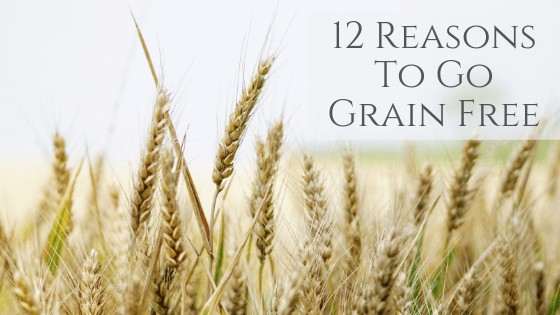
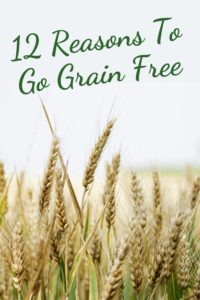
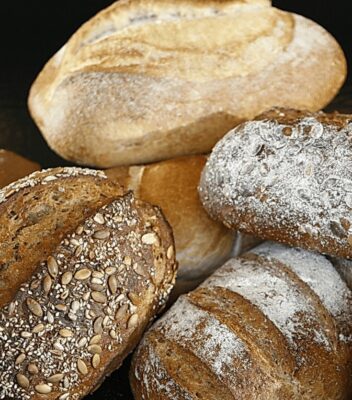 Weight Loss Is A Great Reason To Go Grain Free
Weight Loss Is A Great Reason To Go Grain Free
